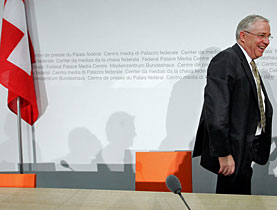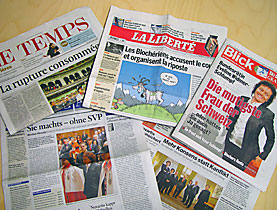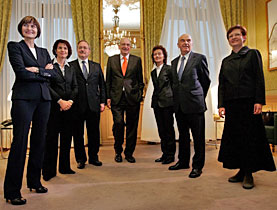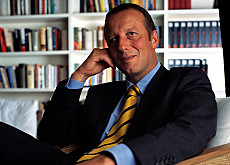“Switzerland’s image set to improve abroad”

This week's unexpected political developments are good for Switzerland's image and for its relations with the European Union, a leading Swiss journalist says.
Roger de Weck, former editor of the Tages-Anzeiger and the Hamburg weekly Die Zeit, tells swissinfo that parliament took the opportunity to correct the image of a country that, in the eyes of the foreign media, is worryingly populist.
“Earthquake”, “storm” and “revolt” – the words used by the European press to describe the rejection on Wednesday of “rightwing firebrand” Christoph Blocher in favour of more moderate Swiss People’s Party rival Eveline Widmer-Schlumpf – reflected the scale of the surprise abroad.
But de Weck says commentators who are predicting the end of the Swiss political system and its brand of consensus government have got it wrong.
swissinfo: Normally the foreign media pay little attention to Swiss politics. Why have these elections generated such interest?
Roger de Weck: The phenomenon of a populist party gaining 30 per cent of the seats in parliament and thereby becoming the most powerful in Europe woke people up. Switzerland was previously considered a moderate country – the country of balance and level-headedness. The advance of the People’s Party resulted in a huge increase in the number of questions being asked.
swissinfo: Parts of the media, not only in Europe but also in the United States, were concerned by the political context and the tone of the People’s Party’s election campaign. Will the ousting of Blocher improve Switzerland’s image abroad?
R.d.W.: It is very good news for Switzerland, and equally for its image abroad, because Switzerland let the populists go a long, long way – much further than in other countries.
Thanks to what parliament has just decided, I think this image will fix itself. People will realise that Switzerland is capable of setting the record straight. This will be perceived positively abroad.
swissinfo: The People’s Party has announced it will go into opposition. Will that make the Swiss political scene comparable with those in other countries?
R.d.W.: Not at all. This opposition won’t change anything fundamentally insofar as it is the focusing on issues that counts in Switzerland and not the favouring of ideology or struggle for power.
It will be important that for each issue, those who today declare themselves in opposition get on with each other and look for partners when they have interests to defend. This announcement has created a lot of waves in the media, but it won’t engender any fundamental change.
swissinfo: So the Swiss political system is not in the process of seeing a certain type of changeover of power among the parties?
R.d.W.: That is impossible in a country that on the one hand recognises direct democracy and on the other comprises so many linguistic, religious and regional minorities. Our country’s diversity is such that it is always necessary to bear in mind a number of very important factors.
In fact, it is difficult to imagine the adaptation in Switzerland of a political system other than the one that already exists.
swissinfo: Populism appears to be on the wane in Europe. Is this trend also perceptible in Switzerland?
R.d.W.: Populism has also peaked in Switzerland. Certainly, people will continue to talk about Blocher for a while, but populism will no longer be the linchpin in Swiss politics. I think from now on we will have to deal with a “half-Blocher” – as the hardliners in the People’s Party disparagingly refer to [their other cabinet minister] Samuel Schmid – whose influence is going to diminish.
The situation is comparable with that in Austria concerning Jörg Haider, but in a totally different way. Populism, which was extremely powerful in Austria, has become marginalised. We are still far from that in Switzerland, but a certain return to normality will prevail over the coming years.
swissinfo: Would relations between Switzerland and the European Union improve if Blocher is no longer in the government but rather head of the opposition?
R.d.W.: It’s not out of the question, now that he is in clear-cut opposition, that Christoph Blocher will launch a referendum against the extension of the bilateral free movement accord to Romania and Bulgaria. But also in that situation I think the Swiss would be reasonable and not follow it. Such a move would call into question our entire relationship with the EU and would affect vital economic interests.
swissinfo-interview: Carole Wälti
Christoph Blocher, a billionaire industrialist and a figurehead of the rightwing Swiss People’s Party, was defeated by 125 votes to 115 on Wednesday by a last-minute candidate from his own party, Eveline Widmer-Schlumpf, in a joint session of parliament called to elect a new seven-member cabinet.
Widmer-Schlumpf, from the more moderate wing of the party, was under heavy pressure from party leaders to withdraw but on Thursday morning announced she would accept the election.
Blocher, whose immigrant policies and vociferous attacks on the European Union resonated with voters but strained the traditional collegiality of the four-party cabinet, vowed to continue his aggressive brand of politics from outside government.
On Wednesday Caspar Baader, the head of the People’s Party’s parliamentary faction, immediately told parliament that the party would go into opposition and would no longer recognise Widmer-Schlumpf or fellow People’s Party minister Samuel Schmid.
Roger de Weck was born in 1953 in canton Fribourg.
De Weck started his career as a journalist after studying economic and social sciences at St Gallen University.
He worked as the Paris correspondent for various Swiss newspapers before leaving to join the publishing industry. He then returned as editor-in-chief for the Zurich daily Tages-Anzeiger and German weekly paper Die Zeit.
He has also acted as an independent editorialist for several Swiss, French and German newspapers and regularly appears on television and radio.
De Weck is president of the foundation of the Graduate Institute of International Studies in Geneva. In 2004 he received the Davos tourism office media prize for his journalistic work.

In compliance with the JTI standards
More: SWI swissinfo.ch certified by the Journalism Trust Initiative



You can find an overview of ongoing debates with our journalists here. Please join us!
If you want to start a conversation about a topic raised in this article or want to report factual errors, email us at english@swissinfo.ch.